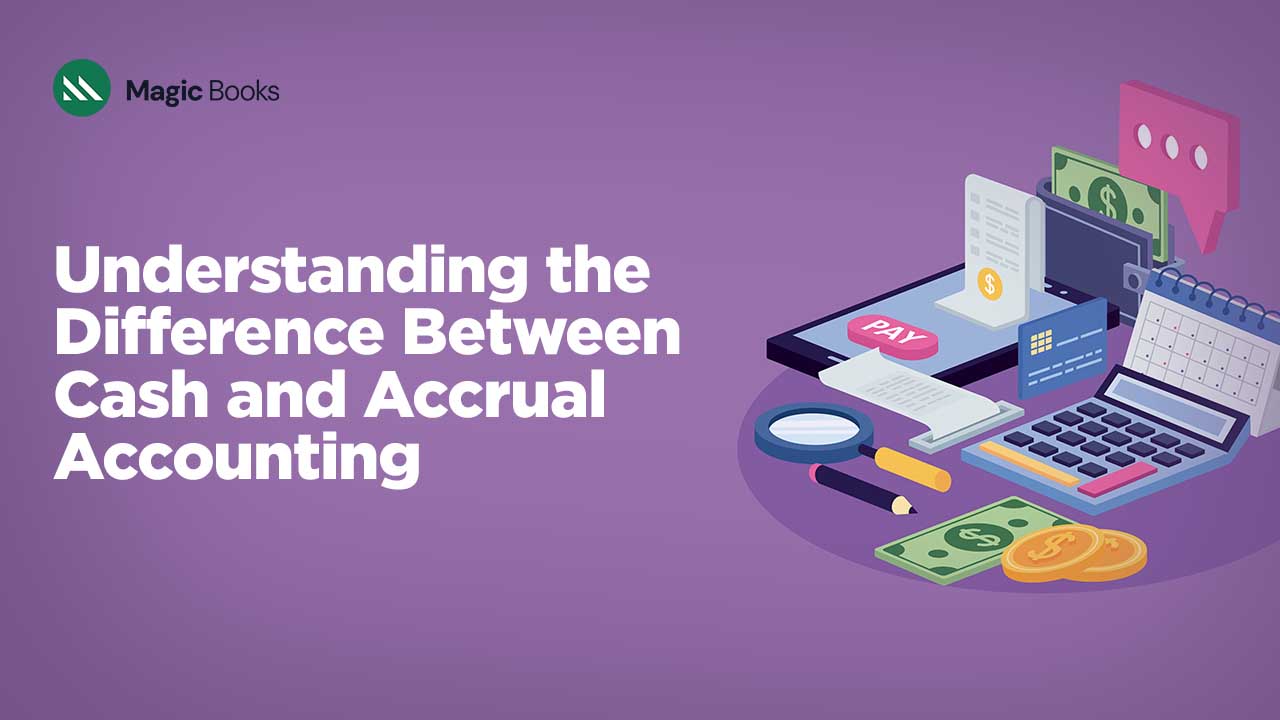For businesses, the method chosen to track the income and expenses will go a long way in clarifying financial decisions and profitability. But how do you know which is the best for your type of business? It becomes really difficult to understand if you are not an accountant, or an entrepreneur. So let’s explore the options that you can explore for your business.
There are two very popular methods: Cash-based accounting and accrual accounting. The main difference is based on when the revenue and expenses start reflecting in your financial books. But the fact that you need to remember is, the difference has nothing to do with the method of payment. To put it mildly or generic, as kids say, when you receive payment from your customers and without procrastinating, you write it down in your books, thats cash accounting, but if you wait until the service is rendered or product is delivered before you put in the books, then its accrual accounting.
Each of them has its pros and cons.
So, how do you choose the right one for your business?
Let’s break this down step by step for you with the fundamental differences between the two, some few FAQs, and even a puzzle to make your understanding solid.
What’s at Stake?
Let’s say that you run a business, and you care to know the health of its finances. Should you track it on a cash basis by seeing when money is coming into the bank and going out, or take a more accrual view of things, when revenue and expenses match with when earned and incurred versus when cash flows through hands? This goes a long way in determining smart business decisions, tax preparation, and gaining investors.
Let’s dive into the details of each approach.
The Basics of Cash Basis Accounting
Cash basis accounting keeps tabs on the financial by recording the revenue when received and expenses when paid in cash. For example, let’s say you are a baker, you have received a check from a customer today for $500 to pay for orders you will fulfill next month. In this case, you will only record that $500 as revenue when you receive it, not when the order is shipped.
This method is quite popular among small businesses and even sole entrepreneurs because it is simple and allows business owners to have an eagle-eye view of the actual cash available at all times.
Pros and Cons of Cash Accounting:
It’s a really simple process. This entire method lets you know how much cash you have in the bank and the best part is that you need to pay taxes for the money you have received. This means, you do not need to pay taxes for the money thats owed to you.
Now thats an advantage of this accounting style.
Remember, there is always a flip side to this.
If you are running a business that requires short term planning, by all means, cash accounting is what you need but in the long term, the financial information you need will feel a little inaccurate. There will be a certain hallucination that will start happening (GenZ calls it delulu). What we are trying to say is, if you have money coming in all the time, you start to look at your books and you might think “Hey, we are doing great, let’s hire a marketer or new VP of Sales, because why not?” It will lead you to believe that you are having a good month. But in reality, it is the last month’s sales that are coming into your books.
You should know that cash accounting does not include accounts receivable and Account Payables. It will be really difficult to keep track of money when your business does not receive money immediately or have outstanding bills to pay. But if you want to track them, you need to do it outside your accounting and tax files or you can use a cash-hybrid methodology.
Puzzle: Spot the Mistake
Suppose a small landscaping business follows the cash method. They completed a large $10,000 project in December but didn’t receive payment until January. In December, their records show a loss for the month, and in January, they show a large profit. Where is the accounting flaw?
(Hint: This is why cash accounting may not give the full financial picture.)
Pros and Cons of Accrual Accounting:
It’s like sitting in a big cockpit and you have visibility in every aspect of your business, financially. This can show how much money is coming in, how much is going out within a specific period of time. In such scenarios, what happens is that your cash flow is broken into transactions which can give you a clear picture of how well your business is doing. Having such clear understanding of financial aspect, most of the business leaders choose to shift to accrual at some point of their business growth. We would suggest to choose accrual from the beginning to make sure you are always one step ahead of your competitors.
Let us add a cherry on that icing that is accrual. When you use this method, you don’t have to pay taxes on services and/or orders until they are fulfilled. This extra money that you save, can help you grow your operations.
Sounds too good to be true right? Well, there is a flip side to this as well!
For those who are a bit lazy in typing, you should know that you need to include your Account Payables and Account Receivables. More importantly, they need to be posted at the current period. So, “no pushing it for later dates” or “I am gonna do it when I go home” for accrual. Now that these details are entered, you need to pay taxes for those Account payables and Receivables. The pros sounded too good to be true right?
If you are a small business and you start with Accrual accounting, it can lead to certain problems. Why? Because it will show large amounts of revenue coming in even though the ban is empty.
In such cases accounting software can come in real handy.
The Mechanics of Accrual Accounting
Accrual accounting collects the receipts of the revenues when earned and expenses when incurred, regardless of whether or not the cash is received or paid for at that time.
For example: You are running a software company, you signed a $20,000 contract to develop a custom application and the work is completed in December. Even if the payment comes in January, under accrual accounting, that $20,000 is recorded as revenue in December.
Cash vs. Accrual Accounting
Let’s zoom out and compare both methods:
| Feature | Cash Basis Accounting | Accrual Accounting |
| Timing of Revenue Recognition | When cash is received | When revenue is earned |
| Timing of Expense Recognition | When cash is paid | When expenses are incurred |
| Accuracy in Tracking | Limited (can overstate or understate financial health) | Comprehensive (more accurate long-term view) |
| Complexity | Simple | Complex |
| Used By | Small businesses, sole proprietors | Large corporations, businesses seeking investment |
| Cash Flow Clarity | Clear, real-time view of available cash | Can obscure cash shortages due to delayed payment |
| GAAP Compliance | Not accepted under GAAP | Required for companies reporting under GAAP |
Can I choose a Hybrid Model?
The answer is yes and no! Hear us out.
There are some small businesses that choose hybrid methods. But how? They might use accruals for inventory and cash basis for income and expenses. This will prompt you to have 2 sets of books. In this case, you need to operate your business in accrual accounting, but to the IRS, you need to report your books with cash accounting. This is because if you do so, you don’t have to pay taxes on any of your products or services that are prepaid.
How cool is that!
But we always recommend you speak to an accountant or tax professional to find out what applies to you and bring this hybrid model up with them as well.
What’s the best one for my business?
There are several million tiny factors that play a huge role in choosing the right one for your business. We may have zoomed it out for you above but let us zoom in a little bit to identify what’s right for your type of business.
As you know by now, a cash basis is good for small businesses. But, if your small business has an inventory system, it’s best to choose hybrid or accrual methods. Now, large businesses generally use an accrual method because it can track income and give financial metrics accurately. Small businesses who are planning to grow start with accrual in the beginning to get prepared for their future.
Lets us bring in the “IRS” aspect to this,
As per IRS regulations, the cash basis accounting can only be available for businesses who has no more than $5 Million in sales per year. But, IRS can only audit all the companies with sales exceeding over $5 Million per year.
Understand an important aspect here, with accrual accounting, financial results of a business likely to match revenues and expenses in the same reporting period. This helps in understanding accurate profitability of a business.
Other Accounting Method:
We know that this blog is only about Cash basis and Accrual accounting. But, we like to go one step further when it comes to sharing information. After all, sharing is caring, right?
You business might be in certain unique situations where cash and accrual might not fit in. In such cases what can we do?
You can choose between, Installment method, Percentage Completion Method and Completed Contract Method.
Now imagine your business sees a piece of commercial real estate for $600,000 with $120,000 as down payment and the remaining $480000 to be paid in the period of 5 years give or take. In such a scenario, your business can report a portion of the capital gain each year which can correspond to the payments received. That’s your Installment method.
Let’s say, a construction company is building a Hugh-rise office building over 5 years. Each year, the company calculates what percentage of the project has been completed and reflects that percentage of the total expected revenue and expenses in that tax year. Now the project is completed roughly 45% and at the end of first year, 45% of the expected profit and expenses will be recorded for that year. This is the Percentage Completion Method.
Think of a contractor who enters a contract to build a residential property which is expected to take 18 months to complete. Here is where the Completed Contract Method works its magic. The contract would defer reporting any income or expenses until the home is entirely finished which simplifies tax reporting and it’s really good for smaller and short term projects.
FAQ: Frequently Asked Questions
Q1: Is accrual accounting more accurate than cash accounting?
A: In terms of long-term financial health, yes. Accrual accounting records revenue and expenses when transactions occur, providing a fuller picture of profitability. However, it can obscure short-term cash flow issues.
Q2: Can a business switch from cash to accrual accounting?
A: Yes, but it can be a complex process that requires IRS approval in some cases, especially if you’re moving from cash accounting for tax purposes.
Q3: Which method is better for tax purposes?
A: The answer depends on your business type. Smaller businesses might benefit from cash accounting due to its simplicity, but accrual accounting can offer tax advantages by deferring income recognition.
Making the Right Choice for Your Business
Now that you have the grasp of both accounting methods, you are all set!
While cash accounting offers simplicity and real-time insights, accrual accounting provides a more accurate and long-term picture, especially for larger businesses or those seeking investments.
Always remember the choice between the two methods can affect everything from your cash flow to tax planning, investor relations and everything in between. So, take time to assess which one aligns best with your business model and growth plans.
Guess the Accounting Method!
Your business booked a massive sale in December but received the payment in January. Your accountant recognized the sale in December’s books. What accounting method are you using?
(A) Cash Basis Accounting
(B) Accrual Accounting



